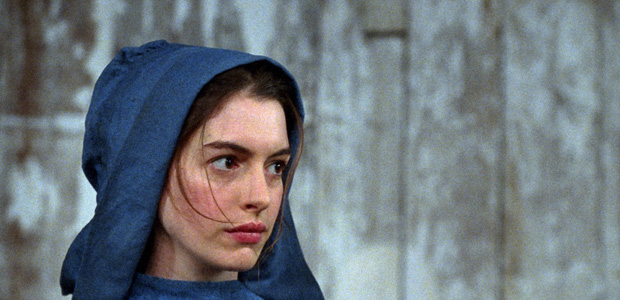On general release from Fri 11 Jan
Tom Hooper / UK / 2012 / 157 min
There’s quite a lot riding on Tom Hooper’s refurbished Les Misérables. Not only is it one of the most celebrated musicals of all time, it joins other notoriously difficult stage-to-screen adaptations and comes at a time when audience appreciation of musical film is up in the air. Earlier box office hits (Moulin Rouge!, Chicago, The Phantom of the Opera) have been met by recent duds (Sweeney Todd, Nine, Mamma Mia!). Can Les Mis relight the fire?
Together with West End wizard Cameron Mackintosh, Hooper has changed very little and has stuck to the full sing-through style of the theatrical version. The duo also replicate the plot, as Jean Valjean (Hugh Jackman) is hunted by Javert (Russell Crowe), despite agreeing to care for Fantine’s (Anne Hathaway) daughter Cossette (Amanda Seyfried) at the dawn of the June Rebellion.
As with the stage show, the success comes down to the ensemble. Hathaway is outstanding as Fantine; her delivery of the iconic ‘I Dreamed a Dream’ is bewitching and thankfully reaffirms it amongst the great musical masterpieces after it was hijacked by Susan Boyle. Hathaway performs it with fragility, aching desperation and sincerity (perhaps a tad much come the end), as Fantine’s world crumbles around her. She outshines the other performers during the little screen time she has; Jackman and Crowe are still believable as Valjean and Javert, contributing fine renditions of ‘Bring Him Home’ and ‘Javert’s Soliloquy’ respectively, but aren’t as secure and mesmerising as Hathaway. Samantha Barks also reprieves her role as Éponine from the 2010 Les Mis anniversary concert with an exceptional performance of ‘On My Own’.
Most impressive of all are the sets and locations; throughout the film the attention to detail is remarkable. From the 19th Century Parisian streets to the costume embroidery, the feel of the film is authentic, which is handled both sensitively and boldly. It looks as Oscarific as Hooper’s previous shoe-in, The King’s Speech. It is colourful yet dingy, fortissimo yet gentle, poignant yet toughened – exactly what Les Mis should be really: a battle of triumphant emotions, passion and fiery political energy. This is even balanced well with Sacha Baron Cohen and Helena Bonham Carter as Thénardier and Madame Thénardier, who provide the moments of pickpocketing Oliver!-style comedy and merriment. On top of all this, it’s just refreshing to watch something where big actors have to work hard to fill even bigger roles.
Also to its credit, the film reverses the recording process. Ordinarily, the orchestra is recorded first and the actors lip-sync their vocals, but in Hooper’s version they all sing live (excluding the opening scene). This allows the performers to set their own tempo, to “act” the songs rather than just sing them. Even though this adds to the immediacy of the drama, there are some troubling camera positions. Shots are longer since the take must be caught in one smooth motion, forcing the camera to linger awkwardly on the performers – and the fisheye lens is too intrusive on the scene itself. It feels invasive rather than intimate. These then jar with the short interlude sequences that are clearly designed to work more succinctly and efficiently on stage.
The main problem is simply the presence of the camera – and the film certainly won’t convert haters of the original. Hooper’s Les Mis seems noticeably long, corny and fails to elicit the same joyous moment of brotherhood and unity that occurs when a stage is packed with cast members. In an attempt to connect us to the performances, there is something unnatural about the way it’s shot, overemotional and sluggish at times yet equally intermittent and brisk. Though this is supposed to provide reflection and juxtaposition, it comes across as disappointingly uneven. There is much to like if you look at the performances, the songs, the humour – and Hooper does capture the disparate worlds of rulers and rebels successfully. But it lacks in many departments: its credence, its rawness, its heart just aren’t reproduced by the lens.
